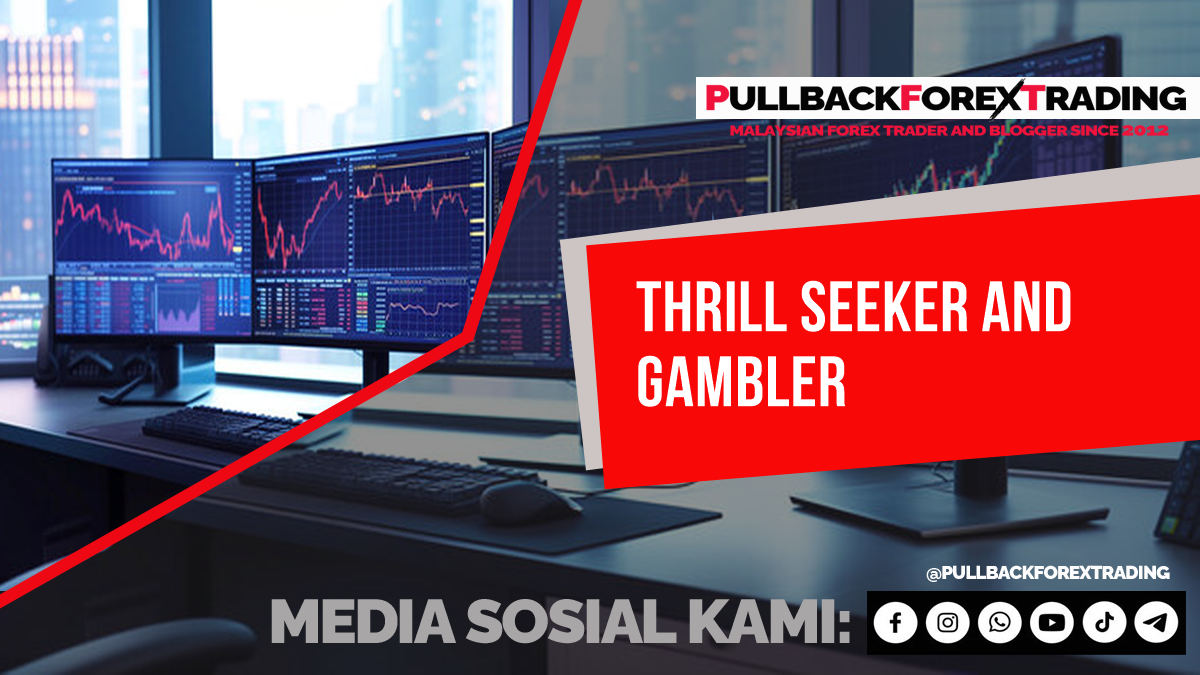
Thrill Seeker and Gambler in Forex Trading
In the world of Forex trading, “thrill-seekers” and “gamblers” often approach the market with behaviors and mindsets that starkly contrast with disciplined, strategic trading. Here’s an analysis of these two profiles:
Thrill Seeker in Forex Trading
Characteristics:
- Chasing Excitement: Thrill seekers often enter trades not for profit but for the adrenaline rush of watching the market move.
- High-Risk Tolerance: They are willing to take on substantial risk, often overleveraging their accounts.
- Frequent Trades: They may jump in and out of trades multiple times a day without a clear strategy.
- Emotional Trading: Decisions are driven by excitement, fear, or impulsiveness rather than logic or analysis.
Impact:
- Short-Term Gains, Long-Term Losses: Thrill-seeking might occasionally result in lucky wins, but this approach often leads to account blow-ups over time.
- Emotional Burnout: Constant emotional highs and lows can lead to stress and exhaustion.
Gambler in Forex Trading
Characteristics:
- Reliance on Luck: Gamblers treat Forex as a game of chance, ignoring technical or fundamental analysis.
- No Risk Management: They rarely set stop-loss or take-profit levels, risking everything on a single trade.
- “All-In” Mentality: Often betting large portions of their account balance in hopes of massive returns.
- Chasing Losses: After a loss, gamblers tend to double down, trying to recover quickly.
Impact:
- Inevitable Account Wipeout: Without proper strategies, the house (market) almost always wins in the long run.
- Addiction Risk: This behavior mirrors gambling addiction, leading to financial and emotional troubles.
Understanding the Root Cause
Before implementing strategies, it’s important to recognize why thrill-seekers or gamblers trade this way:
- Emotional Fulfillment: The market provides a rush, similar to gaming or gambling.
- Lack of Knowledge: They may not understand risk management or trading strategies.
- Desperation for Quick Gains: A desire for rapid financial improvement leads to poor decisions.
Addressing these underlying issues is the first step.
Steps to Overcome Thrill-Seeking and Gambling Tendencies
1. Shift to an Opportunistic Mindset
- Reframe the Objective: Trading is not about constant action but about waiting for the best opportunities. Teach yourself patience by practicing on demo accounts.
- Focus on Quality, Not Quantity: Limit your trades to setups that meet strict criteria, ensuring they align with your strategy.
2. Create a Structured Trading Plan
A well-thought-out trading plan acts as a safeguard against impulsive behavior. Include:
- Entry Criteria: Specific conditions for entering a trade (e.g., price action, indicators, news).
- Risk Management Rules: Define your risk per trade (e.g., 1% of capital) and stop-loss/take-profit levels.
- Daily Trading Limit: Cap the number of trades you can take in a day or week.
3. Develop Emotional Discipline
- Detach from Wins and Losses: View each trade as one of many. A single trade should not define your success or failure.
- Practice Self-Awareness: Recognize triggers (e.g., fear of missing out, revenge trading) and take breaks when emotions run high.
- Meditation and Journaling: Techniques like mindfulness or writing down feelings post-trade can help regulate emotions.
4. Focus on Risk and Reward
- Learn to Love Small Losses: A disciplined trader sees losses as part of the process. Stick to a small stop-loss and avoid moving it out of fear.
- Maximize Profits on Wins: Target setups with favorable risk/reward ratios (e.g., 1:3 or higher). This ensures that even a low win rate can be profitable.
5. Educate and Test Strategies
- Continuous Learning: Study proven trading strategies and refine your approach through research.
- Backtesting: Test your strategies on historical data to build confidence in their viability.
- Start Small: Transition to live trading with minimal capital until your discipline is rock-solid.
6. Leverage Technology
- Automated Alerts: Use trading platforms to set alerts, reducing the temptation for impulsive trades.
- Risk Management Tools: Utilize position size calculators and automated stop-loss features to enforce discipline.
Transforming the Mindset
Adopt a Long-Term Perspective
- Wealth Accumulation, Not Quick Riches: The goal is consistent profitability over time, not hitting a jackpot.
- Compound Growth: Understand the power of compounding small, consistent returns rather than chasing big wins.
Embrace Boredom
Successful trading is often boring. Professional traders spend most of their time analyzing and waiting. Learn to see this as a positive, as it reduces emotional volatility.
View Trading as a Business
- Track Metrics: Keep a journal of trades, noting the reasons, outcomes, and lessons learned.
- Budget Your Risk: Treat your account like a business budget, where capital preservation is critical.
Seek Accountability
- Join a Community: Engage with trading forums or groups where disciplined behavior is encouraged.
- Mentorship: Work with experienced traders who can guide you and call out impulsive tendencies.
How to Transition to a Disciplined Trader
- Adopt a Business Mindset: View trading as a calculated business rather than entertainment or a gamble.
- Develop a Trading Plan: Create a structured plan outlining risk management, entry/exit rules, and goals.
- Focus on Risk Management: Keep risks per trade low, e.g., 1% of your account, and use stop-loss orders.
- Avoid Overtrading: Wait for high-quality setups that align with your strategy.
- Educate Yourself: Learn technical and fundamental analysis to make informed decisions.
- Track Performance: Maintain a trading journal to evaluate and refine your strategy.
Conclusion
Transitioning from a thrill-seeker or gambler to a disciplined trader is a journey requiring self-awareness, education, and persistence. The market rewards those who approach it with respect, patience, and a focus on long-term growth. By adopting a structured plan, controlling emotions, and viewing trading as a business, you can turn impulsive habits into strategic actions.



